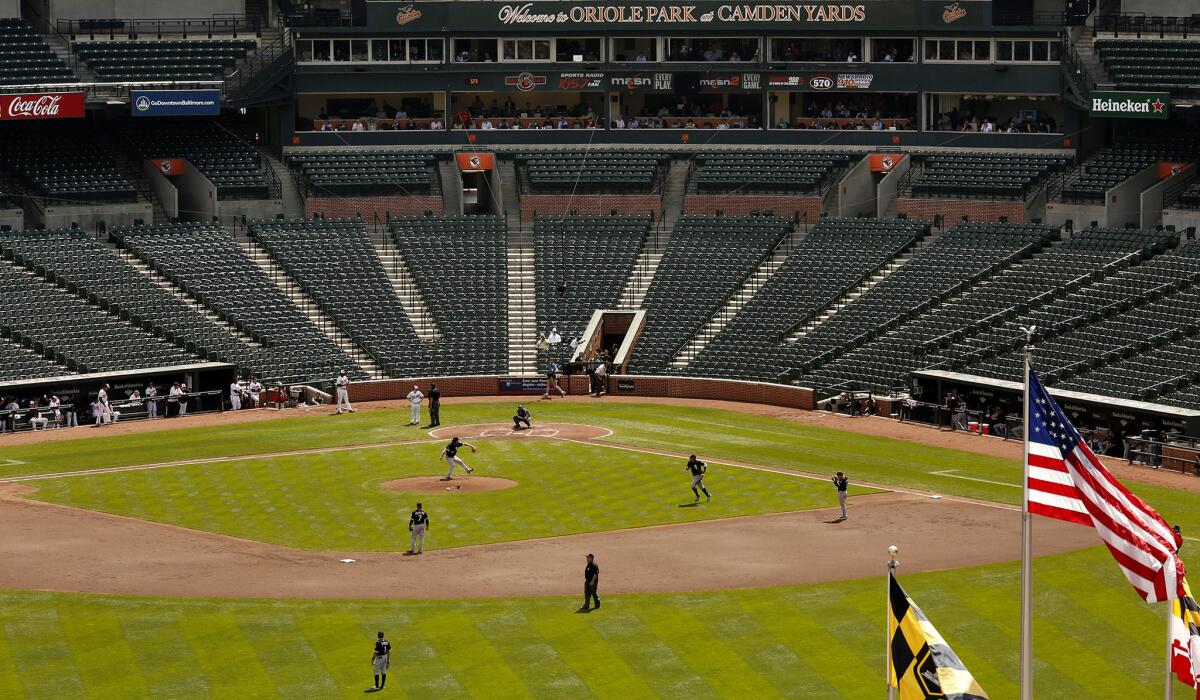Column: In Baltimore, game at Orioles’ locked stadium is safe, serene and sad

No fans were allowed to attend the
It was, by design, the safest and most serene baseball game in major league history.
It was also quite possibly the saddest.
When the Baltimore Orioles hosted the Chicago White Sox on Wednesday at a locked Camden Yards in riot-torn Baltimore, the word “empty” described more than the stands.
Against a backdrop of thousands of vacant green chairs, amid such a deep silence that diving catches sounded like strikeouts, it was an afternoon filled with empty.
The game, an 8-2 Orioles victory played in barely two hours by unsettled guys who hurried through their hacks, felt meaningless.
The mood, marked by the thunk of foul balls rattling off folded seats and rolling around untouched, felt morose.
There was music played when batters came to the plate, but there was nobody to dance. There was the usual playing of John Denver’s “Thank God I’m a Country Boy” during the seventh-inning stretch, but there was nobody to stretch.
There were balls thrown by players into the stands after innings, but nobody to catch them. There was a great running grab by the Orioles’ Adam Jones in center field, but there was nobody to cheer him, which seemed to rattle Jones as he instinctively looked into the stands as if expecting to be showered by the usual praise.
It was only a baseball game, but sports events are part of the national sports fabric that traditionally binds the diverse economic and ethnic corners of this country. Games have always connected people, not kept them apart. Games are traditionally where unsettled communities find their collective voice, not where they are forced into silence.
“It was just a surreal environment,” White Sox Manager Robin Ventura told reporters afterward. “I really don’t think we want to play in another one like this. I don’t think they do, either.”
Fans were barred from the game because officials feared for their safety in the wake of Baltimore-area riots in protest over the death of Freddie Gray, a 25-year-old African American man who died in police custody. While barring the gates at potentially dangerous games occasionally occurs at hooligan-plagued soccer stadiums around the world, it was the first time that fans have been locked out of an American professional sports event. This resulted in the smallest crowd in major league baseball history — zero in paid attendance — and also surely one of its lowest moments.
“Hopefully this was something good, something positive can come from this,” Orioles slugger Chris Davis told reporters. But that’s hard to see how.
Wednesday was the 23rd anniversary of the beginning of the Los Angeles riots fueled by a Rodney King verdict. The unrest prompted the Dodgers to postpone four consecutive games, made up with four doubleheaders later in the season. This forced them to endure 10 games in six days, exhausted their roster, and contributed to an awful 63-win summer, but at least they played the games and their fans could attend them.
Before Wednesday, sports has always played on, and the fans have always cheered on. Former President George W. Bush threw out the first pitch at Yankee Stadium in the wake of the Sept. 11 tragedy. Baseball completed the 1989 World Series in the Bay Area in the wake of an earthquake. The New Orleans Saints returned to the Superdome a year after it was used as a shelter for Hurricane Katrina.
It’s a shame Major League Baseball couldn’t have figured out how to move Wednesday’s game to a date when Orioles fans could have attended. With five months left in the regular season, it’s surprising they couldn’t have figured out a way to play this game somewhere, in front of somebody.
The Orioles have already taken extraordinary measures by scheduling two future doubleheaders with the White Sox, as well as moving this weekend’s home series with the Tampa Bay Rays to St. Petersburg, Fla., while their city continues to mend. So why couldn’t they have fit Wednesday’s game in somewhere else?
The schedule makers said it would have been impossible, but really, doesn’t baseball have a four-day All-Star break? Couldn’t the players for these two teams have gone back to work a day early? They could have also scheduled this game for the day after the regular season, and played it only if it was necessary to decide a playoff spot. That’s happened before with late-season rainouts.
Maybe this game would have never been played, but wouldn’t that be better than playing in front of nearly 46,000 empty seats?
Baltimore Manager Buck Showalter said that when he called down from the dugout for a relief pitcher, he actually heard the bullpen phone ringing.
“It hit me when I made contact and you can hear it echoing off empty seats,” Davis said of his first-inning home run.
Fans pressed against the wrought-iron stadium gates far beyond the outfield, cheering for a game they could barely see, supporting a team that locked them out.
“One part of me says this is bigger than baseball, [but] another part of me says we shouldn’t adjust to what people do outside the stadium,” White Sox outfielder Adam Eaton told reporters. “I’m trying to be as delicate as possible with that, but I think normalcy would be good for people around the city.”
Normalcy on Wednesday was swallowed up in a scene that should chill fans who have long used sports as a way to connect. It was the day that society’s giant campfire was snuffed, its corner tavern locked, its town hall shut down, its common bond broken.
It was the day sports was silenced.
Twitter: @billplaschke
More to Read
Go beyond the scoreboard
Get the latest on L.A.'s teams in the daily Sports Report newsletter.
You may occasionally receive promotional content from the Los Angeles Times.











